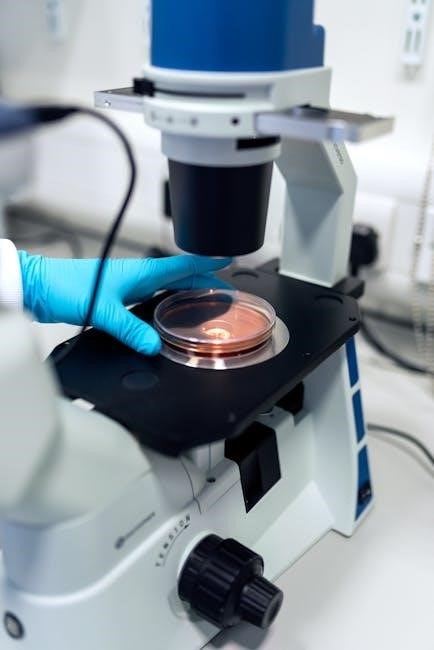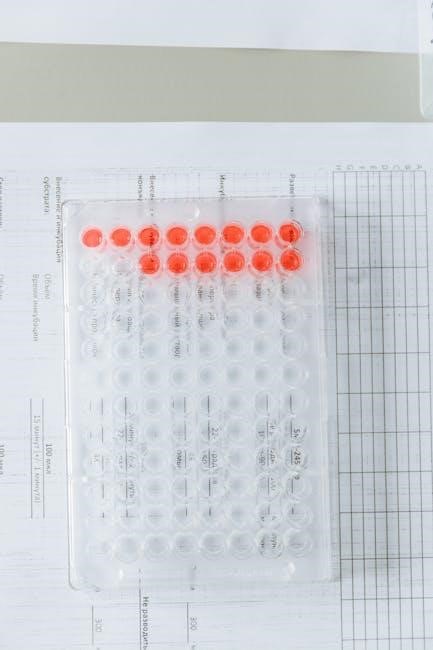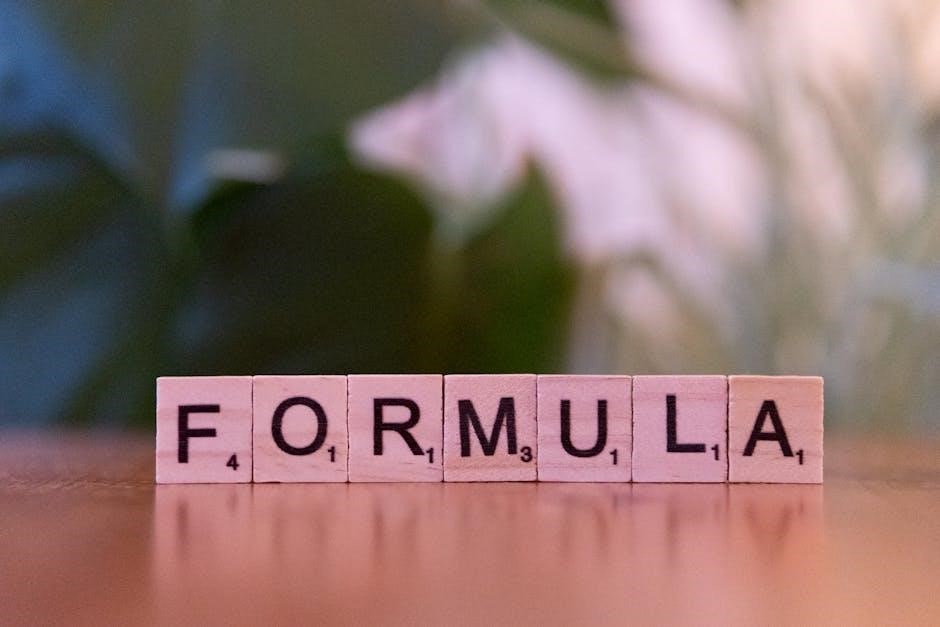scientific method quiz with answers pdf
- by stefanie

This section introduces a scientific method quiz with answers PDF, designed to assess understanding of key concepts. The quiz covers steps, variables, and observations, serving as a valuable resource for students and educators to test knowledge and reinforce learning effectively.
Overview of the Scientific Method

The scientific method is a systematic process used to explore and understand phenomena through structured steps. It begins with observation, leading to a question or problem. A hypothesis is then formulated to explain the observed phenomenon, followed by experimentation to test the hypothesis. Data is collected and analyzed, and conclusions are drawn based on the evidence. This method emphasizes reproducibility and objectivity, ensuring reliability in scientific investigations. It is not limited to professional scientists but is a universal tool for problem-solving and critical thinking. The scientific method quiz with answers PDF provides a comprehensive assessment of these principles, covering key concepts, variables, and experimental design. It serves as an educational resource to reinforce understanding and application of the scientific method in various contexts.
Importance of Quizzes in Learning the Scientific Method
Quizzes play a crucial role in reinforcing the understanding of the scientific method by engaging students actively in the learning process. They help identify knowledge gaps, assess comprehension, and enhance retention of key concepts. Through multiple-choice, short-answer, and true/false questions, quizzes provide diverse ways to test knowledge, catering to various learning styles. The availability of answers in a PDF format allows for self-assessment and immediate feedback, enabling students to track their progress and understand their mistakes. Regular quizzing builds confidence and ensures a solid foundation in the scientific method, making it easier to apply these principles in practical scenarios. Additionally, quizzes prepare students for more comprehensive evaluations, fostering a deeper understanding and mastery of scientific inquiry skills.
Structure of the Quiz with Answers PDF
The scientific method quiz with answers PDF is structured to provide a comprehensive assessment of understanding. It typically begins with multiple-choice questions to test basic knowledge, followed by short-answer sections to evaluate critical thinking. True/false questions ensure familiarity with key terms and concepts. The quiz is divided into sections, each focusing on specific aspects of the scientific method, such as steps, variables, and observations. The PDF format allows for easy access and printing, making it a convenient study resource. Answers are provided at the end, enabling self-assessment and immediate feedback. This structure promotes efficient learning, as students can review their performance and focus on areas needing improvement. The clear organization and detailed answer key make it an invaluable tool for both students and educators aiming to master the scientific method.

Key Components of the Scientific Method
The scientific method involves observation, hypothesis, experimentation, and conclusion. It also includes identifying variables (independent, dependent, controlled) and making qualitative or quantitative observations to test hypotheses effectively.
Steps of the Scientific Method
The scientific method is a systematic process used to explore and explain phenomena. It begins with observation, where scientists notice patterns or problems in the world. Next, they ask questions to focus their investigation. A hypothesis is then formulated to predict outcomes. This hypothesis is tested through experiments, which involve manipulating variables to observe effects. After collecting data, scientists analyze the results to determine if they support the hypothesis. Finally, they draw conclusions, either accepting or rejecting the hypothesis. If the hypothesis is unsupported, the process may repeat with a revised hypothesis. This structured approach ensures that scientific investigations are thorough and reliable. Understanding these steps is crucial for mastering the scientific method.
Independent, Dependent, and Controlled Variables
In scientific experiments, variables play a crucial role in testing hypotheses. The independent variable is the factor intentionally changed by the researcher to observe its effect. The dependent variable is the outcome measured in response to the independent variable. Controlled variables are factors kept constant to ensure the experiment’s fairness and accuracy; For example, in a study on plant growth under different light conditions, the independent variable is the light exposure, the dependent variable is the growth rate, and controlled variables might include water and soil quality. Understanding these variables is essential for designing valid experiments and interpreting results. Quizzes often test this knowledge, ensuring students can identify and explain each type of variable in various scenarios. Mastering this concept is fundamental for applying the scientific method effectively.
Qualitative vs. Quantitative Observations
In scientific research, observations are categorized into two types: qualitative and quantitative. Qualitative observations involve descriptive data, such as colors, textures, or smells, and are often subjective. For example, noting that a plant has yellow leaves is a qualitative observation. On the other hand, quantitative observations are numerical and measurable, like recording the exact temperature or the number of bacteria colonies. These observations are objective and can be analyzed statistically. Understanding the difference is crucial for collecting accurate and reliable data in experiments. Quizzes often include questions that test the ability to distinguish between these two types of observations, ensuring students can apply this knowledge in their scientific investigations. This skill is essential for properly documenting and interpreting experimental results.

Types of Questions in the Quiz
The quiz includes multiple-choice questions, short answers, and true/false questions. Multiple-choice tests knowledge recall, short answers assess understanding, and true/false evaluates factual accuracy, providing a comprehensive assessment of the scientific method.
Multiple Choice Questions
Multiple-choice questions (MCQs) are a key component of the scientific method quiz. These questions present students with a stem and several possible answers, requiring them to select the correct option. MCQs are effective for assessing knowledge retention and understanding of specific concepts, such as the steps of the scientific method or the differences between variables. They are particularly useful for evaluating factual recall and theoretical knowledge. Many MCQs in the quiz focus on identifying the correct sequence of steps in the scientific method, understanding key terminology, and distinguishing between related concepts like hypotheses and theories. By incorporating MCQs, the quiz provides a structured and objective way to measure students’ grasp of foundational principles. Answers are provided in the PDF to facilitate self-assessment and learning.
Short Answer Questions
Short answer questions are designed to test students’ ability to explain and apply their knowledge of the scientific method. These questions require concise, specific responses, often asking students to list steps, define terms, or explain key concepts. For example, questions might ask students to outline the sequence of the scientific method, describe the difference between independent and dependent variables, or explain how to formulate a hypothesis. This format encourages critical thinking and ensures that students can articulate their understanding clearly. The quiz includes short answer sections to assess both factual recall and the ability to synthesize information. Answers are provided in the PDF, allowing students to review their responses and deepen their understanding of the material. This section is particularly useful for reinforcing learning and identifying areas where further study is needed.
True or False Questions
True or false questions are a popular format in the scientific method quiz, designed to test students’ understanding of key concepts and common misconceptions. These questions present statements that require students to determine whether they are correct or incorrect. For example, a question might state, “Forming a hypothesis is the first step of the scientific method,” and students must decide if this is true or false. This format helps clarify misunderstandings and reinforces factual knowledge. The quiz includes a variety of true or false questions, covering topics such as the definition of variables, the purpose of experiments, and the differences between scientific laws and theories. Answers are provided in the PDF, allowing students to verify their responses and gain a clearer understanding of the material. This section is particularly effective for quick assessments and self-study.

Answer Key and Evaluation
The answer key provides correct responses to all quiz questions, enabling students to assess their understanding and identify areas for improvement. It includes explanations for multiple-choice, short-answer, and true/false questions.
How to Interpret Answers

Interpreting answers in the scientific method quiz involves reviewing the answer key to understand correct and incorrect responses. For multiple-choice questions, check if your selected option matches the key. For short-answer questions, ensure your response aligns with the provided explanations. True or false questions require verifying the accuracy of your choices. Analyze patterns in missed questions to identify areas needing improvement. Pay attention to explanations, as they clarify concepts and reasoning. Use this feedback to strengthen your understanding of the scientific method, including steps, variables, and observations. Reviewing answers helps reinforce learning and prepares you for more complex scientific inquiries. Additionally, consider discussing challenging questions with instructors or peers to deepen comprehension. This process ensures effective learning and retention of key scientific concepts.
Common Mistakes to Avoid
When taking a scientific method quiz, common mistakes include confusing the order of steps, misidentifying variables, and misunderstanding key terms. Many students mistakenly believe that only certified scientists use the scientific method, which is incorrect. Others may struggle with distinguishing between quantitative and qualitative observations. A frequent error is failing to recognize that a hypothesis is not just a random guess but an educated prediction. Additionally, students often overlook the importance of controlled variables in experiments. To avoid these mistakes, thoroughly review each concept and practice applying them. Pay close attention to question phrasing and ensure answers align with definitions. Regular practice and review of past quizzes can help identify and correct these common errors, leading to improved performance and a stronger grasp of the scientific method. Consistent effort is key to mastering these concepts.

Resources for Further Learning
For deeper understanding, explore scientific method quiz with answers PDF resources, including study guides, practice quizzes, and detailed explanations. These tools help reinforce concepts and improve test performance effectively.
Recommended Study Guides
To deepen your understanding of the scientific method, numerous study guides are available online. These guides often include detailed explanations of each step, from observation to conclusion, and provide examples of experiments. Many resources, such as those found on Docsity or Google Docs, offer practice quizzes with answers, allowing you to test your knowledge. Some guides focus on specific aspects, like identifying variables or understanding qualitative vs. quantitative observations. They also cover common mistakes to avoid and tips for improving your scientific reasoning. Additionally, study guides often include diagrams and charts to visually explain complex concepts. By using these resources, you can reinforce your learning and prepare effectively for exams or quizzes on the scientific method.
Additional Practice Quizzes
To further reinforce your understanding of the scientific method, additional practice quizzes are widely available online. These quizzes cover a range of topics, from identifying steps in the scientific method to understanding independent, dependent, and controlled variables. Many quizzes include multiple-choice questions, short answers, and true/false formats, catering to different learning styles. Resources like Docsity and Google Docs offer downloadable PDFs with practice questions and answers, making it easy to test your knowledge. These quizzes also address qualitative vs. quantitative observations and experimental design, ensuring comprehensive coverage of the subject. By completing these practice quizzes, you can identify areas for improvement and deepen your grasp of the scientific method. Regular practice helps build confidence and prepares you for exams or classroom assessments. Utilize these resources to enhance your learning journey and master the scientific method effectively.
Related posts:
Download our free Scientific Method Quiz with answers in PDF format. Perfect for students and teachers to test knowledge and understanding of the scientific method.
Posted in PDF